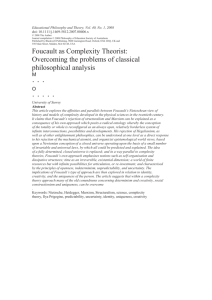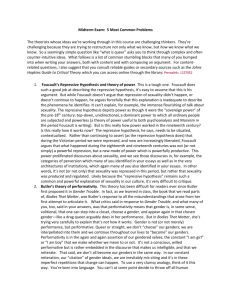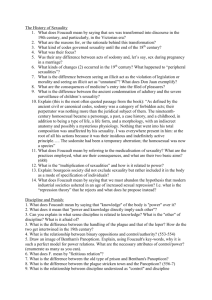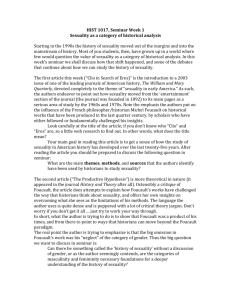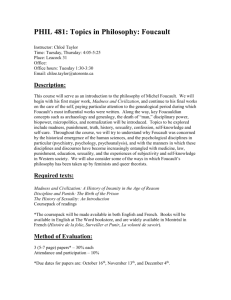Ch. 7 Homework Questions
advertisement
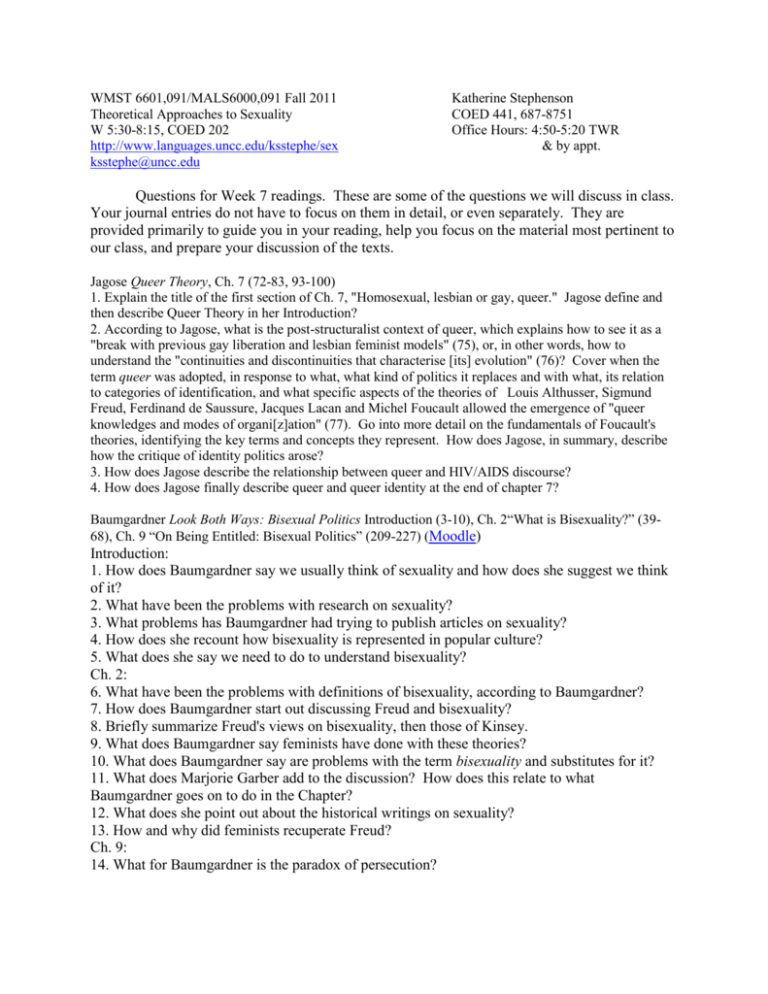
WMST 6601,091/MALS6000,091 Fall 2011 Theoretical Approaches to Sexuality W 5:30-8:15, COED 202 http://www.languages.uncc.edu/ksstephe/sex ksstephe@uncc.edu Katherine Stephenson COED 441, 687-8751 Office Hours: 4:50-5:20 TWR & by appt. Questions for Week 7 readings. These are some of the questions we will discuss in class. Your journal entries do not have to focus on them in detail, or even separately. They are provided primarily to guide you in your reading, help you focus on the material most pertinent to our class, and prepare your discussion of the texts. Jagose Queer Theory, Ch. 7 (72-83, 93-100) 1. Explain the title of the first section of Ch. 7, "Homosexual, lesbian or gay, queer." Jagose define and then describe Queer Theory in her Introduction? 2. According to Jagose, what is the post-structuralist context of queer, which explains how to see it as a "break with previous gay liberation and lesbian feminist models" (75), or, in other words, how to understand the "continuities and discontinuities that characterise [its] evolution" (76)? Cover when the term queer was adopted, in response to what, what kind of politics it replaces and with what, its relation to categories of identification, and what specific aspects of the theories of Louis Althusser, Sigmund Freud, Ferdinand de Saussure, Jacques Lacan and Michel Foucault allowed the emergence of "queer knowledges and modes of organi[z]ation" (77). Go into more detail on the fundamentals of Foucault's theories, identifying the key terms and concepts they represent. How does Jagose, in summary, describe how the critique of identity politics arose? 3. How does Jagose describe the relationship between queer and HIV/AIDS discourse? 4. How does Jagose finally describe queer and queer identity at the end of chapter 7? Baumgardner Look Both Ways: Bisexual Politics Introduction (3-10), Ch. 2“What is Bisexuality?” (3968), Ch. 9 “On Being Entitled: Bisexual Politics” (209-227) (Moodle) Introduction: 1. How does Baumgardner say we usually think of sexuality and how does she suggest we think of it? 2. What have been the problems with research on sexuality? 3. What problems has Baumgardner had trying to publish articles on sexuality? 4. How does she recount how bisexuality is represented in popular culture? 5. What does she say we need to do to understand bisexuality? Ch. 2: 6. What have been the problems with definitions of bisexuality, according to Baumgardner? 7. How does Baumgardner start out discussing Freud and bisexuality? 8. Briefly summarize Freud's views on bisexuality, then those of Kinsey. 9. What does Baumgardner say feminists have done with these theories? 10. What does Baumgardner say are problems with the term bisexuality and substitutes for it? 11. What does Marjorie Garber add to the discussion? How does this relate to what Baumgardner goes on to do in the Chapter? 12. What does she point out about the historical writings on sexuality? 13. How and why did feminists recuperate Freud? Ch. 9: 14. What for Baumgardner is the paradox of persecution? 15. What does she see as important in the changes the movement for gay rights is undergoing? In how queer pop culture has changed? 16. What do you think of the role pop culture plays in Baumgardner's analysis? 17. How is it "a feminist act to firm up the existence of bisexuality" (218)? 18. How does she argue for a bisexual politics? Mills Michel Foucault Introduction “Why Foucault?” (1-7), Ch. 4 “Power/knowledge” (67-79), Ch. 5 “The body and sexuality” (81-95) (Moodle) “Why Foucault?” 1. What are the unusual (i.e., postmodern) aspects of Foucault's approach to analysis that Mills introduces us to? Ch. 4 2. What is Foucault interested in concerning knowledge, and how does this differ from traditional understandings of knowledge? 3. How does he approach the study of "man" (sic) and how does he situate it historically? 4. Explain what he means by power/knowledge. 5. Summarize Foucault's analysis of truth. 6. What did Western feminist theorists discover about the "truth" of women's condition? 7. How is "seemingly critical knowledge" not exempt from the workings of power/knowledge? 8. What is the role of the past in understanding the present? 9. What points does Mills make to summarize Foucault's work on power/knowledge? Ch. 5 10. How does Foucault approach the body and what does his concept of bio-power refer to? 11. Why has his work been useful to marginalized groups? 12. How does Foucault's model of power relations differ from the traditional one? 13. Why does Foucault focus on the body rather than on the individual? 14. Explain his concept of bio-power. 15. What does his analysis of sexuality in The History of Sexuality reveal? 16. What have feminists found useful in his analysis of sexuality? 17. What does Foucault's focus on the body rather than identity allow? 18. Why does Foucault see liberation through sexuality as an illusion? 19. How have feminists used Foucault's notion of disciplinary regime? 20. What points does Mills make to summarize Foucault's work on the body and sexuality?

